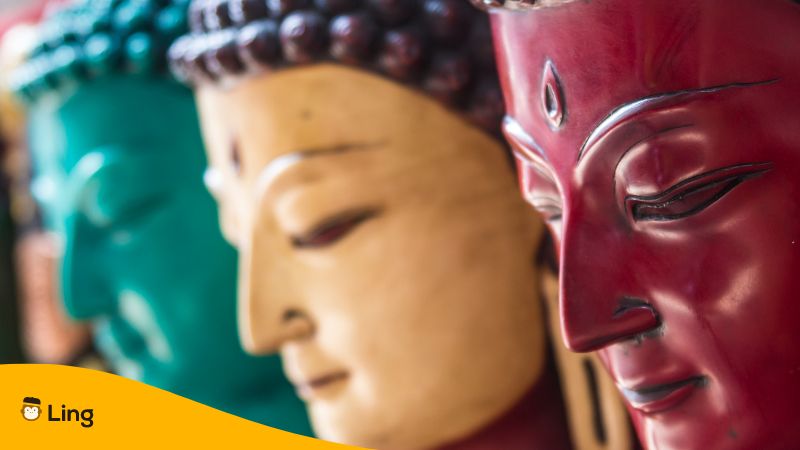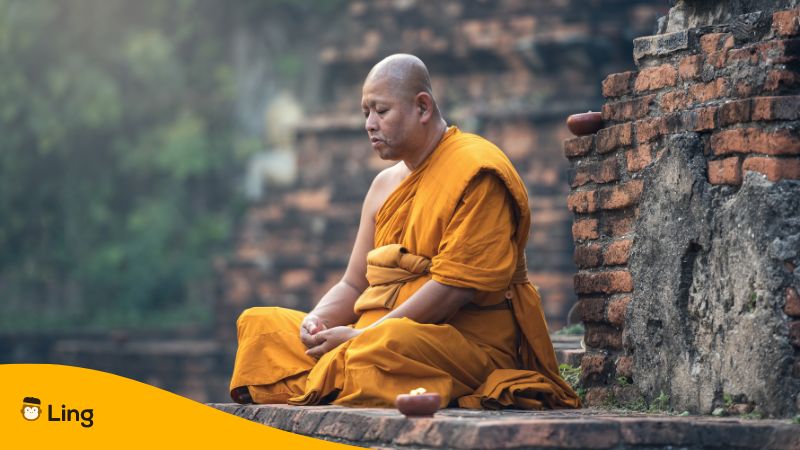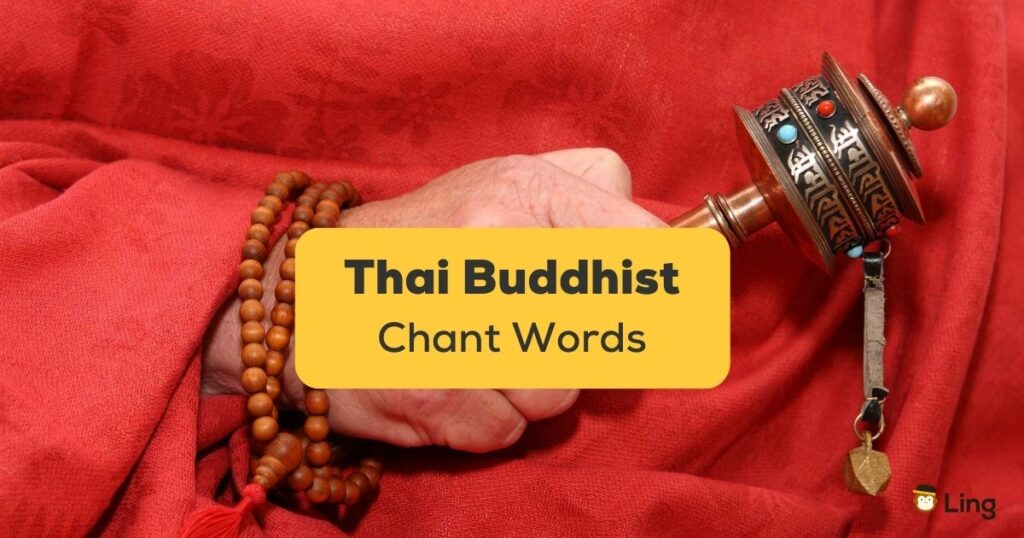You hear the term Thai Buddhist chant words, and a picture of serenity pops up in your mind. A minimalist open space filled with natural light, the diffused fragrance of sandalwood incense sticks floating around while a reverberating sound emanates from a singing bowl.
Amidst all this, you hear the murmurs of peaceful yet invigorating chanting. Now, if this isn’t bliss, I don’t know what else is! In this post, let’s get to know the three most popular chant words that every traveler should know.
Let’s start!
3 Thai Buddhist Chant Words
#1 Homage To The Buddha
Namo Tassa Bhagavato Arahato Sammā Sambuddhassa (ขอนอบน้อมแด่พระผู้มีพระภาคเจ้า ผู้ทรงคุณอันประเสริฐ ผู้ทรงตรัสรู้แล้ว)
Chant translation: Honor to Him, the Blessed One, the Worthy One, the fully Enlightened One.
This chant is a homage to the uncomparable Buddha – the Exalted one – eulogizing him with many honoring adjectives.
#2 Triple Gem Or Tisarana
Buddhaṃ Saraṇaṃ Gacchāmi, Dhammaṃ Saraṇaṃ Gacchāmi, Saṅghaṃ Saraṇaṃ Gacchāmi (ข้าพเจ้าขอถึงพระพุทธ พระธรรม พระสงฆ์เป็นที่พึ่ง)
Chant translation: I take refuge in the Buddha, I take refuge in the teaching(Dhamma), I take refuge in the monastic order (Sangha).
Tisarana (ไตรสรณะ), also known as the Triple Gem, is probably the most widespread of Buddhist chants in the modern world. It is one of the most basic chants the disciples and lay people can chant. With this chant, you are invoking yourself to seek the guidance of the Enlightened One, his teachings (Dhamma), and the monastic order left behind by him (Sangha).
#3 The Five Percepts: Pancasila
Ᾱṇātipātā Veramaṇī Sikkhāpadaṃ Samādiyāmi (ข้าพเจ้าสมาทานศีลเว้นจากการเบียดเบียนสัตว์ที่ยังหายใจอยู่): I undertake the pledge to abstain from onslaught on breathing beings.
Adinnādānā Veramaṇī Sikkhāpadaṃ Samādiyāmi (ข้าพเจ้าสมาทานศีลเว้นจากการถือเอาของที่เขามิได้ให้): I undertake the pledge to abstain from taking what is not given.
Kāmesumicchācāra Veramaṇī Sikkhāpadaṃ Samādiyāmi (ข้าพเจ้าสมาทานศีลอบรมเว้นจากการประพฤติผิดในกาม): I undertake the pledge to abstain from sexual misconduct.
Musāvādā Veramaṇī Sikkhāpadaṃ Samādiyāmi (ข้าพเจ้าสมาทานศีลเว้นจากการพูดเท็จ): I undertake the pledge to abstain from false speech.
Surāmerayamajjapamādaṭṭhānā Veramaṇī Sikkhāpadaṃ Samādiyāmi (ข้าพเจ้าสมาทานศีลเว้นจากการดื่มสุราและเมรัยอันเป็นโอกาสให้เกิดความประมาท): I undertake the pledge to abstain from alcoholic drink or drugs that are an opportunity for careleesness.
With this chant, one takes an oath of abstaining oneself from all that the Awakened One taught one to stay away from.

History Of Buddhism
Buddhism is one of the oldest religions in the world. It is believed to have come into existence somewhere around 588 BCE in the northern parts of present-day India. This Dhamma-based religion was founded by Gautam Buddha (also called Gautam, the Buddha), a renunciate who was born a royal prince and attained enlightenment or Nirvana through penance and perseverance.
He was born Prince Siddhartha Gautam of the Shakya clan (belonging to the Kshatriya varna or warrior class based upon the class system laid down in the Vedic times) in a place called Lumbini in present-day Nepal. Hence, he was also known as Buddha Shakyamuni or the enlightened sage from the Shakya clan.
Buddha means the enlightened one. Gautam Buddha attained enlightenment under a fig tree, which later came to be known as the Bodhi Tree, in the city of Bodh Gaya, situated in the Bihar state of India.
Buddhism In Thailand
Buddhist chanting is an integral part of Buddhism across its many schools. Chanting is believed to be the traditional path of preparing one’s mind to sit in meditation. It can be seen as an anchor that stills the “monkey mind” and creates a tranquil space for an evolved state of mindfulness.
Buddhism (พุทธศาสนา), over the centuries, has branched out into three main schools of thought. They are the Theravada, Mahayana, and Vajrayana schools of Buddhism. This Dhamma-based religion traveled from the ancient Pataliputra city of north India to Myanmar (Burma), Sri Lanka, Thailand, and other neighboring states via the Theravada Buddhist monks sent by King Asoka in the third century BC.
Thailand has Theravada Buddhism in its cultural-traditional roots. 95% of the Thai population follows Buddhism. What’s more, Thailand is the only monarchy whose King needs to be a born Buddhist to accede to the throne. Dhamma-based life is the undercurrent of Thai living. This signifies that Thai life moves along a holy life.
Chanting As A Practice
Chanting is alluded to as one of the spiritual practices that help human beings not only pay homage to their gods and masters with a reverential salutation and a tactical way of practicing mindfulness. A chant centers a person in the present wisdom, and being in the present moment is what delivers happiness (Khwām s̄uk̄h – ความสุข).
Chanting Mantras also help one accumulate and absorb the inherent wisdom well-expounded by the Exalted One. Not only that, if one chants such a chant regularly, this counts as a way of cultivating virtue, concentration, and wisdom. Through chanting, one reaches the Triple Gem.

Thai Buddhist Vocabulary
Theravada Buddhism is the only branch directly linked to the early Buddhist period. The central texts of Theravada Buddhism are, thus, written in the Pali language that was spoken by Gautam Buddha. These texts are collectively called Pali Canon or Pali Tipitaka and describe the early life and teachings of the Buddha.
Pali is a Middle Indo-Aryan language that was indigenous to the Indian subcontinent. Today, Pali is a dead language because there are no native speakers of this language. However, it has been preserved as a liturgical language, meaning that there are Pali texts, vocabulary, and chant words still in use.
Most of the Southeast Asian region where Theravada Buddhism prevails – Sri Lanka, Myanmar, Laos, Thailand, and Cambodia – still has a prevalence of these Buddhist texts in the Pali language. You can have a look at some of that vocabulary below.

You Can Learn More Thai With Ling
These Buddhist chants might be quite a mouthful at the beginning. However, with the help of the Ling app, you can take your first step towards learning how to speak the day-to-day Thai language.
With its gamified interface, interactive exercises, and fun quizzes, you are bound to make quick progress in your language-learning journey. Picking up a language has never been this easy!
So, without further ado, go to your Google Play Store or Apple App Store and download the Ling App for free now!




































































